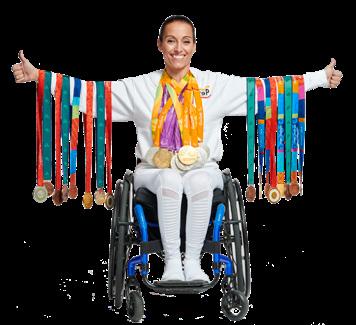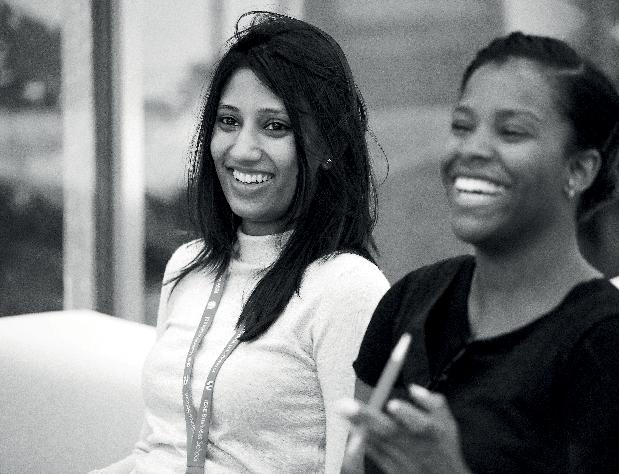
8 minute read
FULL STOP
www.aisaphotos.com / Courtesy of Teresa Perales : credit
Head water above
If anyone knows how to turn personal trials into triumph, it’s Teresa Perales. Within five years of losing the use of her legs at age 19, she was competing in the Paralympics, winning 26 medals over the course of her swimming career. Here she shares her secrets for staying afloat, even during a pandemic.
“I n Zaragoza (Spain), there was a sports center for children with an unorthodox method for identifying promising swimmers. They threw you in the water, and if you floated, you were worth training; if not, you weren’t. I didn’t float, so they told my parents that swimming wasn’t for me.”
Almost 40 years later, Teresa Perales has accumulated 26 medals for swimming at the Paralympic Games, and many more in World Cups and European championships. How did a girl with no apparent talent become a champion? Perales credits two defining moments in her teenage years. The first was the death of her father when she was 15. “It was a very hard time, but it made me realize that it’s not worth having regrets,” she recalls. Four years later, she was diagnosed with neuropathy and lost the use of her legs, which left her in a wheelchair. “I had to learn to do many things again,” she says. Among them, learning to swim. The first week, she had to wear a life jacket, but within a year, she was achieving her first swimming victories.
Although this period in her life was one of great uncertainty, she can now see how it benefited her. “I learned so much in those times. A person who falls and gets up again has many more tools than someone who has never fallen. I think that
gives me an advantage.” She doesn’t see the two events that defined her life as failures or tragedies; rather, they were opportunities to learn, gain experience and figure out what she needed to change. In this, her
learning curve can be likened to that of an entrepreneur who suffers an unexpected setback or whose first try at starting a business hasn’t worked out.
Perales remembers the day she got up in the morning and simply forgot to look at her feet as “the beginning of a new stage in my life, of realizing that I would never walk again and that, from then on, I would do things differently. Perhaps the process would be uncomfortable and more difficult, but I was not going to do things badly because of that.”
Armed with this new outlook on life, Perales has driven in a rally, swum with sharks, traveled the world and been a member of parliament in Aragon, the region of Spain where she is from. The key has been to change her mindset and to stop looking for excuses. “Complaining gets you nowhere; you need to act. It’s important to have challenges and to remember that something terrible may be followed by something wonderful. Experience has taught me that this is often the case.”
Discover your potential
“You’re a diamond in the rough that we have to polish,” Perales’s first swimming coach told her. The phrase has had a profound impact on her, professionally and personally. “At the time, I didn’t realize the scope of such a comment, but it left a powerful mark,” she recalls.
Over time, the swimmer has come to believe that her coach didn’t see anything special in her, and that he said the same to all his students. Yet it served as inspiration, a self-fulfilling prophecy that drove her forward. “Now I say the same thing to managers when I give talks and conferences,” she admits. “It’s the best thing anyone can say to you, especially when you believe it.”
Reaching the top as an athlete isn’t just a question of motivation, of course. Perales swims between three and six hours a day, and in the past, even more. But in sports, as in many other areas of life, training hard is no guarantee of success. “You risk everything in a few seconds.” In her case, 35.88 seconds:
the time of her world record-setting 50 meter freestyle at the 2008 Paralympic Games in Beijing.
She recommends not focusing on results but enjoying the process and even the uncertainty generated around the launch of any new venture, with peace of mind. “Deep down, the uncertainty is good. It makes you appreciate what’s really important,” she says. Although naturally, she always goes out “wanting to win.”
Just do it
To be able to live with uncertainty and channel it into positive actions, Perales is committed to working hard on emotional management, insisting it’s one of the keys to success. “I’ve struggled for years to stop thinking when I get on the pool bench.” She finds that if she thinks about it too much, she doesn’t win. “I distract myself, and the focus doesn’t go where it needs to be: on swimming fast.” She has also learned to value the journey: “I find it makes me enjoy the decisive moment even more.”
Knowing her strengths and weaknesses is another key. There’s nothing better than thoroughly knowing yourself for helping you get into the flow, so you can act without overthinking, she says.
Deescalating and not overly dramatizing the situation is another trick. To manage your fears better, remove their teeth, she
Competing when thrown in at the deep end
Ready • Look for a mentor who helps you believe in yourself • Practice, practice and practice • Don’t hide behind excuses
Set • See the value in uncertainty: It helps you appreciate the good things • Know your strengths and weaknesses • Learn to laugh at yourself and your fears
Go! • When the moment of truth comes, stop thinking and act • Enjoy the process, not just the final result • Believe that it will all work out
Photos courtesy of Teresa Perales
says. “Fear is wonderful and necessary, because it keeps you alert, but you have to manage it so it doesn’t leave you blocked. I make a point of laughing at fear or laughing at myself.”
Work against the odds
Fear and uncertainty have been constant for many during 2020, with a global pandemic bringing human activity around the world to a halt. “People began working from home and children switched to classes online, but for athletes it is impossible to swim or play tennis online,” Perales said during a recent media interview. She dealt with the stay-athome orders by improvising a gym at home where she could train every day, using sports equipment that simulated her movements in the pool.
During the first three-month national lockdown in Spain, she set herself three goals: first, establish a routine; second, prioritize activities that felt good and safe; and third, make plans for the future, to remind yourself that there would be an end point. And she committed herself to positive thinking. The lockdown wasn’t all bad, she says: “I spent more time with my husband and son, and I’ll treasure that.”
But the main lesson she draws from the year in which she has spent the least amount of time in the water is: Never take anything for granted, because it can disappear in an instant. “I had already learned that lesson,” she acknowledged. “But now it has been reinforced. You always learn a little more.”
Look to the future
Perales has competed in Sydney (2000), Athens (2004), Beijing (2008), London (2012) and Rio de Janeiro (2016), but “continuing to dream of future Paralympic Games is essential to my plans,” she says. Her focus is to stay strong and compete in Tokyo.
Although initially scheduled for summer 2020, the Tokyo Games were postponed due to the pandemic. If all goes well, they will take place in summer 2021. Perales’s goal remains to surpass the 28 medals of the U.S. swimming champion, Michael Phelps, who, unlike Perales, has retired from competition.
When she participates in the next Games, she will be 45 and a year older than expected, among increasingly younger rivals. But that is not something that worries her. “I have always used my mental capacity above all else.”
For now, the only certainty is that the path to Tokyo 2021 will be different for everyone, and no one knows exactly how it will be. But Perales is content to think positively and “to dream that everything will work out.”

article by: Tomas Crespo, based on an interview and appearances Perales has made at a number of IESE events organized by professor Santiago Alvarez de Mon.
Leadership Coaching Program
The breakthrough power of coaching
As the world continues to adapt to a new reality, global executives need to step back and reflect on their role in a changed world. If you seek new insights to inspire and motivate others during challenging times, IESE’s Leadership Coaching Program is for you. Through a flexible format and evidence-based coaching framework, you will acquire new abilities to empower leaders, teams and organizations from diverse contexts and cultures to reach higher levels of performance.
Are you ready to drive positive change? Learn more about this breakthrough program today.
Next intake: May 2021
More information: María Navarro Associate Director infogm@iese.edu www.iese.edu/coaching
No pandemic should stop talent

Covid-19 Scholarships
At IESE, we want to make sure that COVID-19 doesn’t prevent promising talent from studying with us. That’s why we’ve launched our COVID-19 Scholarship program, aimed at young professionals interested in pursuing one of our Master’s degrees and at high-potential managers working in sectors hardest hit by the pandemic.



